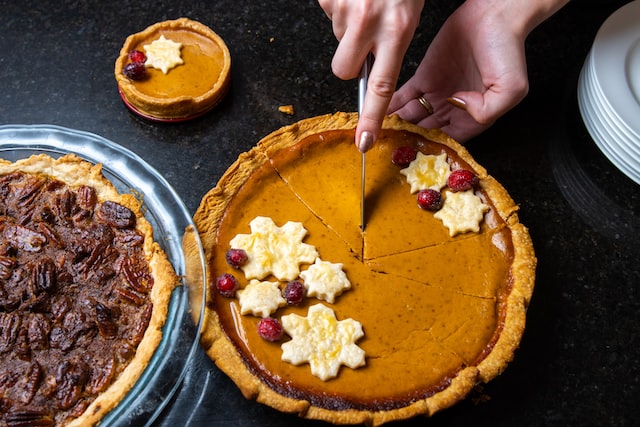The rest of the world tends to look on, semi-bemused as the confetti cannons go off and the president pardons a turkey. It’s a whole thing you guys.

Changing With The Times
Thanksgiving is changing with the times too — as more and more Americans acknowledge the Indigenous populations who first inhabited the land and try to incorporate this into their celebrations. It remains a time when families travel for miles just to spend time together, be warm, jolly, and eat and eat and eat!

What does this mean for the rest of the world (and the Americans who don’t observe Thanksgiving) however? Well, Thanksgiving is as good an excuse as any to practice gratitude. It’s what the whole holiday is about after all! In this case, it doesn’t have to be based on a specific historical event — you can simply use the sentiment of ‘giving thanks’. It’s an important time of year to do it too. The days are getting darker, it’s cold, the glitzy sparkles of Christmas haven’t yet come to sweep us off our feet. It’s a good time to check in with yourself, wherever you are.
Practicing Gratitude
Practicing gratitude is not a new idea. It has long been studied, with Charles Darwin asserting that animals as well as humans feel the complex emotions ”…jealousy, suspicion, emulation, gratitude, and magnanimity.”
It began to be given more weight as a concept in the 1970s, when Robert Trivers introduced the theory of reciprocal altruism. A kind of ‘tit for tat’ system, it is when one being puts themselves out for the benefit of another, usually with the understanding that the favor may be repaid in the future. It is gratitude that regulates our response to that kindness, and motivates us to reciprocate. However, although gratitude may grease the wheels of reciprocity, acts of gratitude — true ones — are not done with a reward in mind. In this way it helps us build social bonds, friendship, and even love.
The Harvard Medical definition of gratitude is;
“a thankful appreciation for what an individual receives, whether tangible or intangible. With gratitude, people acknowledge the goodness in their lives … As a result, gratitude also helps people connect to something larger than themselves as individuals–whether to other people, nature, or a higher power”
Psychedelics Induce Feelings of Gratitude
Doesn’t sound a world away from the experience of a psychedelic trip really does it? Many people come away after a deep shroom journey with feelings of connection to their loved ones, the world at large, and whatever may lie beyond it.
Not that we are suggesting that magic mushrooms can replace naturally occurring feelings of gratitude — rather, they can ring a bell that reminds you of what you are thankful for, or deepen the ones you already feel.

Bearing this in mind, let’s dive deeper into gratitude. You can read the following from either a sober, everyday perspective, or as guidelines or something to consider during a psilocybin trip. Or both! (Options! They’re a thing to be grateful for…)
The Two Stages of Gratitude
Not to be confused (thankfully) with the 5 Stages of Grief, according to Dr. Robert Emmons, editor-in-chief of The Journal of Positive Psychology, gratitude involves two stages. These are:
- The acknowledgement of the good things in your life. You see that your life is good. It is rich, varied, and full of potential. This gratitude is a power that makes you able to care for others, and let your warmth shine from within, saying ‘yes’ to life and its adventures.
- Recognizing the sources of your gratitude that are external to you. This is about being thankful for everything that makes your life good. It is kinda impossible to feel gratitude for yourself. Think about the people, animals, nature, activities, and ideas that make you feel grateful.
5 Ways To Practice Gratitude
Think (or Say) What You are Grateful For
It may seem like something from a holiday TV special — you know the bit where everyone sits around a turkey dinner and says ‘I’m thankful for…’ — but y’know what, it’s not a bad idea. Even just thinking and visualizing in your head a few things you feel grateful for everyday can have significant impacts. These include improved mood throughout the day and better sleep. This is a technique also used by therapists when starting treatment with a patient. Try writing down what you are grateful for to really digest the feelings.

Say ‘Thanks!’
It sounds simple but saying thank you vocalizes our gratitude. Not just for the person you’re thanking but also for ourselves. It reaffirms while making the other person’s day. This ‘thank you’ doesn’t have to be for a specific thing — it can be for the other person making you feel good, or just being a friend, or a help. Try calling your mum just to thank her — you’ll truly brighten her day, and yours.
Keep a Gratitude Journal
Journaling has quickly become the mental health tool du jour. When we write we utilize different parts of our brains to access memories and an almost 2nd person perspective. Research has shown that keeping a gratitude journal activates our positive emotions. And, next time you are feeling down, leafing through your own book of positivity is a valuable tool.

Consider the Intentions of Others
When someone does something nice for you, however large or small, take a moment to think of their good intentions. Feel touched that they thought of you and reached out, or took the time, to do something kind or thoughtful. Visualize it as a light moving from them to you.
Meditate
Meditation can take your integration of gratitude to the next level. You can find different guided meditations to do which focus on gratitude, love and thankfulness. Otherwise, you can pick a specific thing you are thankful for and let it grow inside you, getting stronger as you focus on the feeling.

So, there you have it! You may not celebrate Turkey Day, but you can still give thanks for the good in your life, every day of the week — wherever you are.






